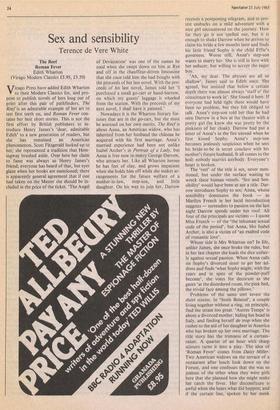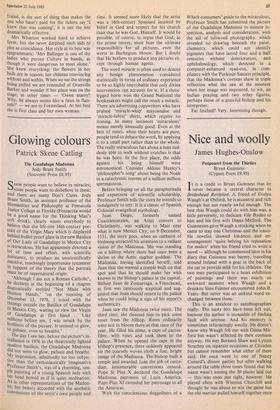Sex and sensibility
Terence de Vere White
"Virago Press have added Edith Wharton
V to their Modern Classics list, and pro- pose to publish novels of hers long out of print after this pair of pathfinders. The Reef is an admirable example of her art to test first teeth on, and Roman Fever con- tains her best short stories. This is not the first effort by British publishers to in- troduce Henry James's 'dear, admirable Edith' to a new generation of readers, but she has remained an American phenomenon. Scott Fitzgerald looked up to her; she represented a tradition that Hem- ingway brushed aside. Over here her claim to fame was always as Henry James's friend; everyone has heard of that, but eyes glaze when her books are mentioned; there is apparently general agreement that if one had taken on the Master she should be in- cluded in the price of the ticket. 'The Angel
of Devastation' was one of the names he used when she swept down on him at Rye and off in the chauffeur-driven limousine that she once told him she had bought with the proceeds of her last novel. With the pro- ceeds of his last novel, James told her 'I purchased a small go-cart or hand-barrow, on which my guests' luggage is wheeled from the station. With the proceeds of my next novel, I shall have it painted.'
Nowadays it is the Wharton literary for- tunes that are in the go-cart, but she must be assessed on her own merits. The Reef is about Anna, an American widow, who has inherited from her husband the château he acquired with his first marriage. Anna's married experience had been not unlike Isabel Archer's in Portrait of a Lady, but Anna is free now to marry George Darrow, who attracts her. Like all Wharton heroes he has feet of clay, and grows impatient when she holds him off while she makes ar- rangements for the future welfare of a mother-in-law, step-son, and little daughter. On his way to join her, Darrow receives a postponing telegram, and in pro- test embarks on a mild adventure with a nice girl encountered on the journey. How far they go is not spelled out, but it is enough to shake Darrow when he arrives to claim his bride a few months later and finds his little friend Sophy is the child Effie's governess. Worse still, Anna's step-son wants to marry her. She is still in love with her seducer, but willing to accept the eager boy.
`Ah, my dear. The abysses are all so shallow', James said to Edith once. She agreed, but insisted that below a certain depth there was almost always 'stuff o' the conscience to work in'. She found it here. If everyone had held tight there would have been no problem, but they felt obliged to talk. Anna's step-son told her that he had seen Darrow in a box at the theatre with a pretty girl (he knew she was pretty by the pinkness of her cloak). Darrow had put a letter of Anna's in the fire unread when he first kissed Sophy. Anna's step-son becomes jealously suspicious when he sees his bride-to-be in secret conclave with his mother's future husband. It all comes to the boil: nobody marries anybody. Everyone's heart is broken.
The 'reef' of the title is sex, never men- tioned, but under the surface waiting to wreck these human vessels. 'Sex and Sen- sibility' would have been as apt a title. Dar- row introduces Sophy to sex; Anna, whose sensibility dominates the book — as Marilyn French in her lucid introduction suggests — surrenders to passion on the last night Darrow spends under her roof. All four of the principals are victims — I quote Miss French — of the 'the inhuman sexual code of the period', but Anna, like Isabel Archer, is also a victim of 'an exalted code of romantic love'.
Whose side is Mrs Wharton on? In life, unlike James, she once broke the rules, but in her last chapter she loads the dice unfair- ly against sexual passion. When Anna calls on Sophy's divorced sister to get her ad- dress and finds 'what Sophy might, with the years and in spite of the powder-puff become', she votes for decorum as she gazes 'at the disordered room, the pink bed, the trivial face among the pillows.'
Problems of the same sort invest the shOrt stories. In 'Souls Belated', a couple living together without a ring, on principle, find the strain too great. 'Autres Temps' is about a divorced mother, hiding her head in Italy, and finding herself de trop when she rushes to the aid of her daughter in America who has broken up her own marriage. The title story has the trimness of a curtain- raiser. A quarter of an hour with sharp scissors turns it into a play. The idea of `Roman Fever' comes from Daisy Miller. Two American widows on the terrace of a restaurant after lunch look down on the Forum, and one confesses that she was so jealous of the other when they were girls here that she planned how she might make her catch the fever. Her discomfiture is awful when she hears what did happen; and if the curtain line, spoken by her meek friend, is the sort of thing that makes the one who hasn't paid for the tickets say 'I knew that was coming', it is not the less dramatically effective.
Mrs Wharton worked hard to achieve form, but she never despised such aids to plot as coincidence. Her style at its best was epigrammatic: 'Mrs Ballinger is one of the ladies who pursue Culture in bands, as though it were dangerous to meet alone.' She knew everything: the flowers in her beds are in season; her château convincing without and within. When we see the strings being pulled we are reminded of Granville Barker and wonder if her place was on the stage; at other times — 'Owen marry? Why, he always seems like a faun in flan- nels!' — we are in Forsterland. At her best she is first class and her own woman.







































 Previous page
Previous page